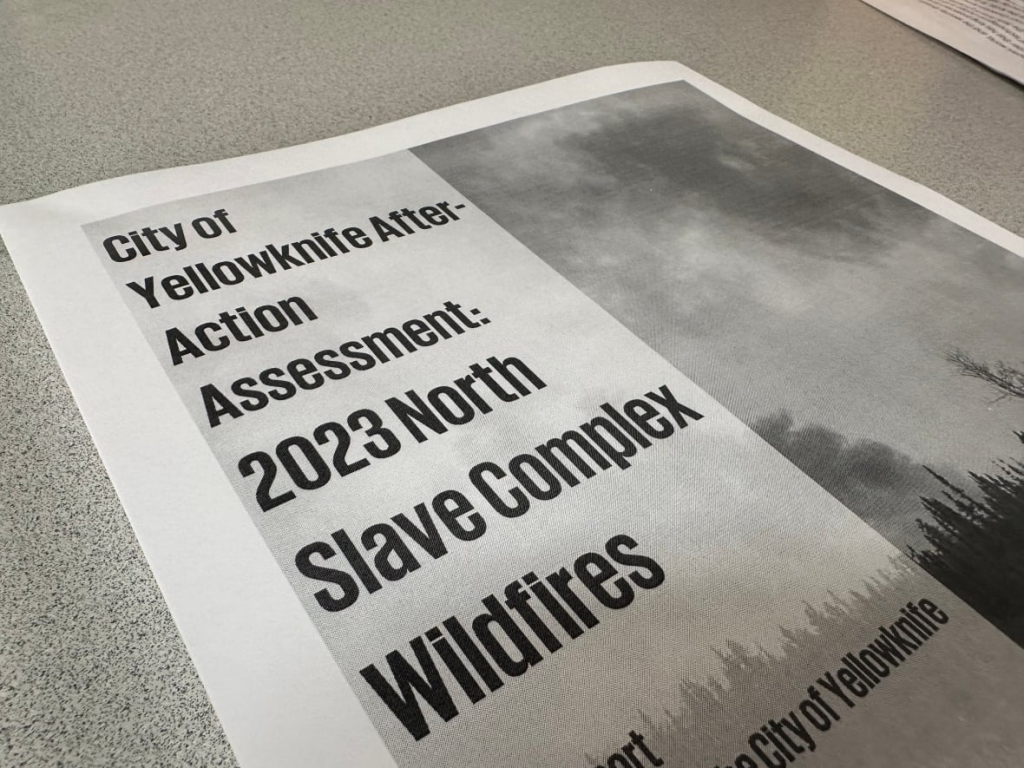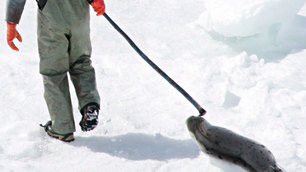Report: Poor communication caused confusion & stress in Yellowknife evacuation

‘We made the best decisions we could,’ maintains city manager
The firm tasked with reviewing how the City of Yellowknife handled last summer’s wildfire evacuation presented 26 recommendations to city council about how it could do better in the event of another wildfire threat.
KPMG told the city about the interim findings of its after-action assessment in the spring. The firm presented its final 130-page report for the first time to city council on Monday afternoon, after speaking with 24 of the city’s partners, nine key city staff, members of the emergency operations centre, and the public.
The recommendations have to do with co-ordination, public communications, vulnerable populations, emergency operations and evacuation planning. KPMG also outlined 19 key strengths and 35 areas where there was room for improvement.
“We’ve spent a lot of time through this process reflecting on the actions taken last summer,” said Sheila Bassi-Kellett, as she introduced the report at Monday’s council meeting. Bassi-Kellett was the city’s manager at the time of the evacuation and is now in the role again on an interim basis.
“I still fully believe, at the time, we made the best decisions we could about our response with the information we had at the time.”

KPMG found that FireSmarting is one area where the city could improve. Though city staff, contractors and volunteers put in “considerable effort” to build firebreaks and install sprinklers, KPMG pointed out that the work was done while wildfires were bearing down on the city — not during what it called the “mitigation and preparedness phase.”
KPMG found that although the city used the local state of emergency to harness resources, the timing of the declaration may have meant it took longer to get those resources. It also found there was a lack of clarity around the N.W.T.’s Emergency Management Act, particularly once the territory invoked its own state of emergency.
Another area with room for improvement, according to KPMG, was communication. The report describes how a lack of co-ordinated and clear communications from both the city and the N.W.T. government led to “significant confusion and stress” for the community. It also found the city did not have a detailed plan for a mass evacuation — a plan KPMG said should have been communicated to the public in advance.
Needs of vulnerable people were inadequately addressed
While organizations supporting vulnerable people made “substantial contributions” to help their clients during the evacuation and the return home, KPMG found the city and the territory’s plans didn’t adequately address the needs of vulnerable people, and the evacuation had “many negative consequences” for them.
The city also does not have a business continuity plan, KPMG found. This led to “significant disruptions” in operations leading up to and during the evacuation related to finance, information technology, and administration.
KPMG recommended that the city co-ordinate with the N.W.T. government to establish a “formal decision-making process” for declaring states of emergency and issuing evacuation notices, alerts and orders, and to reach a “shared understanding” of what the emergency act means.
Among its list of recommendations, KPMG also wants the city to establish a position within its emergency operations centre to help local organizations co-ordinate support for vulnerable people, develop an emergency management training plan for staff and a detailed wildfire evacuation plan.
Rebecca Alty, the city’s mayor, told councillors she’d sent a copy of the report to the N.W.T. government and had requested a meeting to discuss what to do next, since many of the recommendations called for co-ordination.
She said city staff would present an update in the fall about what has been done to address the recommendations.
Related stories from around the North:
Canada: Yukon government to review this summer’s wildfire evacuations in Mayo, Old Crow, CBC News
Norway: Smoke from Canadian wildfires forecast to reach Norway, The Associated Press
Russia: New NOAA report finds vast Siberian wildfires linked to Arctic warming, The Associated Press
Sweden: High risk of wildfires in many parts of Sweden, including North, Radio Sweden
United States: Wildfires in Anchorage? Climate change sparks disaster fears, The Associated Press



